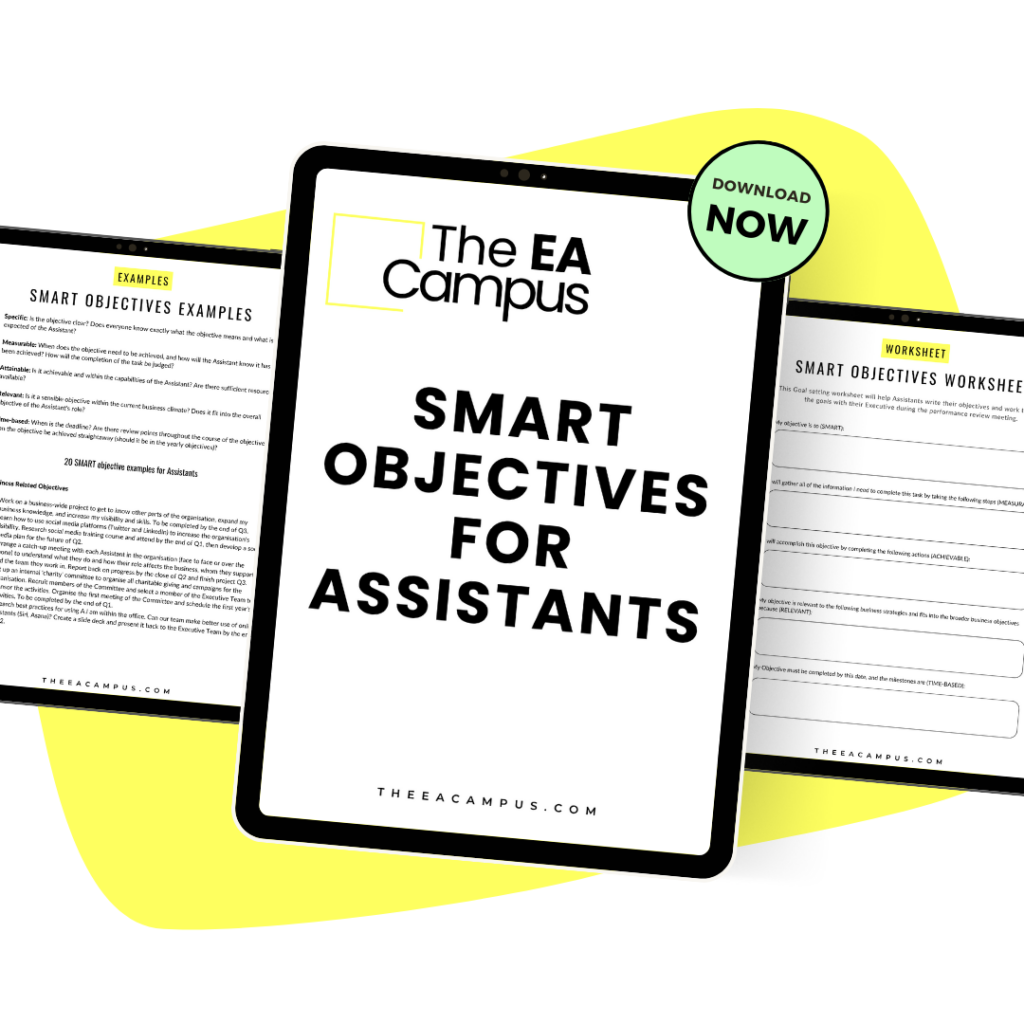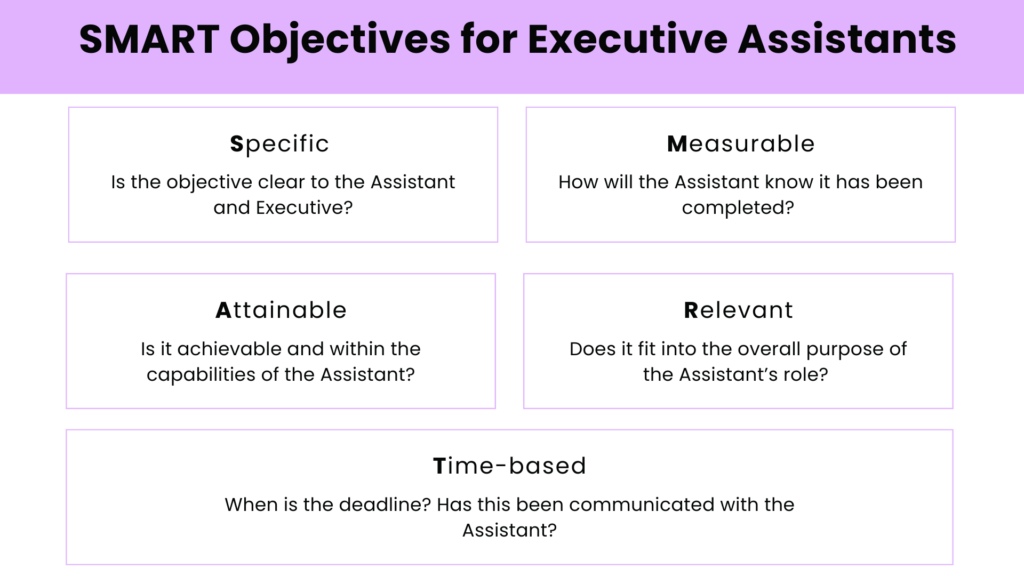Setting SMART objectives for Executive Assistants is crucial because, without them, Assistants can be at a significant disadvantage. They may be taken for granted, mismanaged, and left without clear expectations in their roles.
If an Executive takes little time to help their Assistant set reasonable objectives, how can they effectively evaluate the Assistant or develop a career plan? It isn’t easy without setting clear objectives.
Assistants should proactively approach their objectives to ensure they have a series of pointers leading to a fantastic performance review. Career development objectives are essential for Assistants, guiding their growth and success.
Setting goals and SMART objectives goes beyond performance reviews; it’s critical for an Assistant’s overall success. Without clear objectives for the year ahead, Assistants may find it challenging to scope their roles.
The Assistant role is continuously evolving, with Assistants being asked to take on more work than ever. They must serve as sounding boards for their Executives, understand all administrative systems across the business, be proficient with technology, and possess exceptional emotional intelligence.
The roles of Personal and Executive Assistants have expanded far beyond managing diaries and booking travel. Without a coherent list of objectives for the year, Assistants will struggle to measure their success against an ever-expanding workload and the increasing demands of their roles.
Goal setting is essential for Assistants and something they must do annually to succeed.
So, where should Assistants start? How do you set SMART objectives for your Personal or Executive Assistant role? That’s likely why you’re here.
Over the years, The EA Campus has written extensively about performance reviews and setting goals and objectives for Assistants. We know it’s common for Assistants to leave their goal-setting until the last minute due to their busy schedules managing others’ needs.
Finding time to discuss goals and objectives with your Executive can be challenging, and often Assistants struggle to determine the right goals and objectives for their roles. The job is demanding and fast-paced, with frequent changes to work plans, making it difficult to plan goals and objectives for the year ahead.
While Assistants work on complex tasks and projects, they also handle many routine tasks like diary management, travel booking, email management, and administrative duties. These tasks are hard to set objectives for and measure in terms of success and performance.
Executives will notice when these tasks go wrong, but if an Assistant is excellent in their role, these tasks are often completed without a second thought.
That said, goal and objective setting is critical to becoming a top-level Executive Assistant. The EA Campus has many resources for Personal and Executive Assistants who want to set SMART objectives and create achievable goals for their careers.
We will cover the following:
- Setting Objectives for Assistants – Best Practice Guidance
We will explore the difference between goals and objectives and how Assistants can set both for the year ahead. We will discuss strategies to ensure Assistants create goals and objectives they can stick to and offer tips and tricks to align their objectives with their Executives’. - What are SMART Objectives?
Learn what SMART objectives are and how to create a list of measurable objectives for Personal and Executive Assistants to elevate your career and keep you on track for the year ahead. - Examples of SMART Objectives for Assistants
Knowing the challenges Assistants face when planning their objectives, we will provide a list of brilliant objectives and goals that Assistants can apply to their roles.

Ace your next performance review with this fantastic SMART objectives and goal-setting template bundle.
These free templates can help you stay organised and on track throughout the year.
Whether you want to set ambitious goals during your yearly review or draft clear objectives during regular meetings with your Executive, our bundle has everything you need.
Setting Objectives for Assistants – Best Practice Guidance
Setting goals and objectives throughout the year is crucial for an Assistant’s career and personal development. Working towards specific objectives and seeing the value you add to your organisation should increase your confidence and provide a reason to expect and ask for salary increases and bonuses annually.
How Should You Set Goals for Your Executive or Personal Assistant Career?
The first point to note is the difference between goals and objectives. Often, the same language is used to describe plans for the year ahead, but goals and objectives differ:
- Goal: A clear, single-minded statement of an outcome—an ambition—to be reached within a specific timeframe. For example, “We will redesign the company’s website to make it more user-friendly by the end of next quarter.”
- Objective: The actions needed to achieve that goal. For example, to redesign a website, you may need to reallocate some marketing spend towards digital capabilities, find the right web designer, or conduct User Experience research to define what “more user-friendly” means.
Both goals and objectives are essential for Assistants when planning their career development and the year ahead. Goals help Assistants succeed in their roles, while objectives are the steps needed to achieve those goals. Now that we have defined the difference between goals and objectives, let’s concentrate on setting goals that Assistants can progress throughout the year.
Four Strategies for Assistants to Implement Goal-Setting
- Find out the why behind your goals – what is the context? When working with your Executive on your goals for the next year, ensure you understand why they are essential to you, your Executive, and the broader organisation. Understanding the context and the value these goals add will make them easier to achieve.
- Break your goals down into action points and objectives. Large goals can seem impossible when viewed as a whole, so break them down into smaller action points that you can tick off throughout the year. Reward yourself when you complete a task that brings you closer to your goal, as this will motivate you to continue.
- Get some accountability. Hold yourself accountable for achieving your goals. In a business setting, this is often easier because your Executive may require progress reports, and salary increases or bonuses may depend on achieving your goals. For personal career goals, consider finding an accountability partner to help you stay on track.
- Plan out time for your goals. Assistants are often busy helping others achieve their goals and may forget to plan their own. Dedicate time in your schedule for your career and personal development. Communicate your goals with your Executive and ensure they understand their importance.
Aligning Your Objectives with Your Executive’s Objectives
For Executive and Personal Assistants, understanding your Executive’s goals and objectives is crucial. Your objectives should align with their objectives. For example, if your Executive has a strategic goal like “increase awareness of brand X,” you might have a practical objective such as “organise a launch party for brand X.”
Knowing your Executive’s focus areas allows you to prioritise your workload, ensuring tasks related to these areas are completed first. This alignment adds value to your role and enhances your Executive’s success.
How to Ensure Assistants Meet Their Objectives
Focusing on your Assistant career is one of the most important things you can do. If you don’t take control of planning your career, no one else will. The EA Campus offers sessions on creating a growth plan to map out your career as an Executive or Personal Assistant, featuring insights from industry leaders.
What are SMART Objectives?

SMART objectives for Executive Assistants are essential for career advancement and clarifying expectations. Here’s a definition of SMART objectives specifically for Executive and Personal Assistants:
- Specific: Is the objective clear? Does everyone know exactly what is expected of the Assistant?
- Measurable: When does the objective need to be achieved, and how will the Assistant know it has been completed?
- Attainable: Is it achievable within the capabilities of the Assistant? Are there sufficient resources available?
- Relevant: Is it a sensible objective within the current business climate? Does it fit into the Assistant’s overall role?
- Time-based: When is the deadline? Are there review points throughout the objective?
Examples of SMART Objectives for Assistants
Creating SMART objectives for Executive Assistants can be challenging, but it is not impossible. Let’s explore examples of goals and objectives that Assistants can use to elevate their careers and receive the recognition they deserve.
Business-Related Objectives for Executive and Personal Assistants
Assistants have a unique position within their organisations, providing both strategic and practical value. Start by examining business processes and identifying areas for improvement. Once identified, set objectives to implement these improvements.
Skills-Related Objectives for Executive and Personal Assistants
Maintaining and enhancing skills is vital for Assistants. Each year, add skills-related objectives to your goals, justifying your attendance at training sessions and conferences. For example, “Maintain advanced knowledge of all Microsoft packages, including Outlook, Excel, Word, PowerPoint, and OneNote. Update skills each quarter, to be completed by Q4.”
Task-Related Objectives for Executive and Personal Assistants
Consider adding goals that stretch you and contribute to personal and professional development. For example, “Streamline the Executive’s schedule to ensure time for strategy and reflection. Implement by Q2.”
Personal Objectives for Executive and Personal Assistants
Personal development objectives show a commitment to growth. For example, “Complete a training course on assertiveness to improve project management skills by Q2.”
Before writing your SMART objectives, download our FREE templates and guides from The EA Campus for setting SMART objectives tailored to your role.
Remember, setting objectives is part of a much larger picture—your yearly appraisal. We also have an excellent article on maximising the benefits of your performance review as an Assistant. For more tips and tricks on career development, SMART objectives, and thriving as an Assistant, be sure to check out The EA Campus community. Join us today and gain access to a wealth of resources, insights, and support from other professionals in the field.




